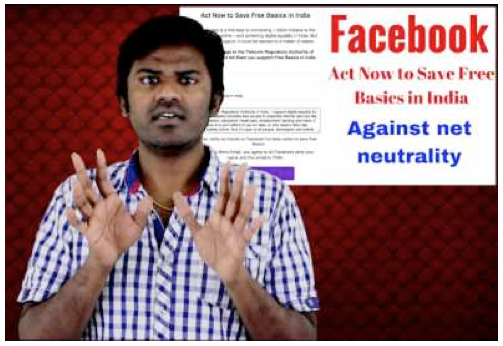CommentsEDITOR’S PICK--Today, Indian telecom regulator TRAI reaffirmed the principles of net neutrality by banning discriminatory pricing on the basis of content, including so called “Zero Rating” schemes like Facebook’s controversial Free Basics program. The decision marks a major victory for grassroots activists in India and around the world who have been calling for such a ban, and a setback for companies like T-Mobile and Verizon, who have been pushing similar practices in the U.S., claiming that they do not violate net neutrality.
Fight for the Future, a U.S. based digital rights group that played an instrumental role in last year’s net neutrality victory at the Federal Communications Commission (FCC) and who have vocally opposed Zero Rating programs/offerings including Facebook’s Free Basics program, issued the following statement, which can be attributed to campaign director, Evan Greer:
“Today’s decision is a major victory for free speech and for Internet users everywhere, no matter what Mark Zuckerberg’s well-paid public relations team might tell you. It’s worth noting that if T-Mobile were operating in India, these new rules would ban their BingeOn throttling scam.
The basic principles of net neutrality are what have made the Web into what it is today. Zero rating schemes and discriminatory pricing are just another tool to favor some applications over others. They allow ISPs to pick winners and losers, and create the same harms as fast lanes and slow lanes. They give Internet Service Providers too much power to shape Internet users’ online experience, and open the floodgates for potential censorship and abuse.
The same arguments of course apply here in the U.S.. The FCC should move quickly to explicitly ban similar practices by Internet providers in the United States who have been misleading customers and breaking net neutrality principles with Zero rating schemes.”
Fight for the Future has been active in defending net neutrality in the U.S. through a series of high profile campaigns including the Internet Slowdown protest, which drove three quarters of a million comments to the FCC in a single day. Previously they worked with Popular Resistance to organize an “Occupy the FCC” encampment outside FCC headquarters, making national headlines.
This year, Fight for the Future has focused on exposing and opposing T-Mobile’s BingeOn scheme, which violates net neutrality by throttling all video streaming by default. They also signed on to an Open Letter to Mark Zuckerberg, demanding Facebook stop using their platform to mislead Indian users about the Free Basics program. In the coming weeks, Fight for the Future and other groups plan to continue pressuring the FCC to enforce net neutrality rules in the U.S. by stopping these Zero rating practices.
(Fight for the Future is dedicated to protecting and expanding the Internet's transformative power in our lives by creating civic campaigns that are engaging for millions of people.)
-cw
Sidebar
Our mission is to promote and facilitate civic engagement and neighborhood empowerment, and to hold area government and its politicians accountable.

 CityWatch Los Angeles
Politics. Perspective. Participation.
CityWatch Los Angeles
Politics. Perspective. Participation.
30
Fri, Jan















